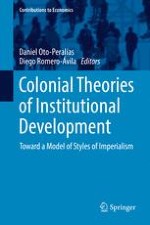2017 | OriginalPaper | Chapter
4. Empirical Methodology and Baseline Regression Results
Authors : Daniel Oto-Peralías, Diego Romero-Ávila
Published in: Colonial Theories of Institutional Development
Publisher: Springer International Publishing
Activate our intelligent search to find suitable subject content or patents.
Select sections of text to find matching patents with Artificial Intelligence. powered by
Select sections of text to find additional relevant content using AI-assisted search. powered by
